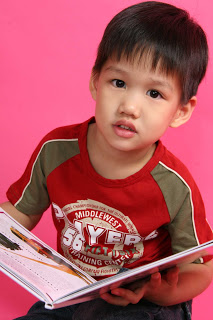Continuing from my previous post on motor skills, I shall talk about what I did to enhance and stimulate his verbal skills.
Many parents are concerned with their child’s verbal skill, they will often ask how do I stimulate my child’s verbal skill especially so if your child is the first born. As parents, we are the main source of information through which our child will learn about his surrounding and how to interact in it. Some children suffered language and communication difficulties due to lack of parental interaction and concern. Verbal skill is a very important component in a child growth process as it allows the child to interact with adults and also stimulate his brain development.
Thus, it is important that we help our child to develop and enhance their verbal skills right from birth. Research has shown that one to one attention from parents to the child is essential in order to help him develop his verbal skills fully. This is most crucial from birth to 3 years old where the foundation blocks for future learning for the child are established.
From birth to 1 year old:
A baby will start to communicate when he is born through sounds like crying or cooing when happy and make facial expressions like smiling and even body movements like moving his hands or legs up and down in excitement. Baby also loves to listen and respond to your voice and other sounds. We can encourage interaction by responding back to him.
Tips for interaction with baby: I will hold Vincent about ten inches away from my face so that he
can focus. The reason being, infant can’t see near object clearly. I will talk, sing to him and at the same time make facial expression to arouse his interests. He will look intently at me and respond back sometimes by cooing when he is excited. Over time, this action helps him to be familiar with the sounds and pattern that associated in a speech which will form the basis for language development. I feel that a good time for mothers to engage in such activity is after breast-feeding or after feeding your baby when he is more relaxed. Fathers, you should also know that this is a good way for you to bond with your child.
At eight months, most babies are quite good at playing with sounds and talk by babbling. They can play peek-a-boo. This is one of Vincent’s favourite games, he is able to respond in excitement and also by waving his arms and kicking his legs. Baby at this stage is able to understand and respond to gestures, facial expressions and tone of voice. By playing simple game like peek-a-boo, you are encouraging and enforcing his interaction and social skills.
The key to help your baby form a good basis for language is simply by talking to him. Keep talking and share your everyday life with him. In this way, you are constantly reinforcing the sound of speech and he will be able to pick up from you. Gradually bring to his attention the names of everyday objects, like when I tell Vincent, I like to eat apple, I will show him apple and say apple. I remembered there was once when he has just started talking, he suddenly said “Bus” in excitement when he saw a bus on the road. We were very surprised. He is also able to distinguish correctly a taxi from a car. Through time, he is able to associate the word with the object.
From 1 to 3 years old:
Once a child reaches 12 to 18 months, he will be able to pronounce new words slowly about 6 or more but he understands a lot more words, it can be more than 70 words. As his vocabulary increases, he will begin to add action verbs such as “come” and directives such as “up” and “down”.
Tips for learning and interaction: To stimulate him, we will often ask Vincent questions like when is the lift going, he will point and say “up”. At this stage, he is also having fun learning about his body parts, you can help build his vocabulary by referring to when I say “eyes” and point at his eyes. He loves to play with his belly button. I will ask him where is your belly button? He will lift up his shirt and point at it. Children get excited andmotivated to learn and speak more when they get their answers correct, we can often encourage them by helping and giving them lots of encouragement and praises.
I also noticed that like most boys, Vincent loves cars, trucks and buses. For example, he was able to learn, differentiate and speak about the various types of trucks like trailer truck, dump truck, mixer truck etc. Know what your child interest is and he will learn faster in the area he is interested. Most people will ask is it too early for my child to learn and speak more than one language, it is never too early. Since birth, I have been exposing Vincent to English and his mother tongue, Mandarin. I use the 50 words as a benchmark for each language. You will realize that for most children after hitting 50 words, he may experience a vocabulary explosion of picking up new words faster than you can even track them. However, each child has his own milestone, do not pressurize him but give him time to learn and pick up words. Always praise your child when he learns a new word and this positive feedback will encourage him to learn more.
Before a child reaches two years old, he is capable of understanding simple questions and is able to string words together. To stimulate him, reading to your child is a good habit. When you read, you can ask him to point at certain items in the book like who is Mickey Mouse? Vincent will point at it although he may not be able to pronounce the words but he knows who is Mickey Mouse or Donald Duck. Eventually he will be able to pick up and say those words. He will often pick up the books, go to me and say “Mama read”.
At 2 to 3 years old, a child will develop a good understanding of language and his vocabulary will
increase extensively. He is able to talk in simple sentences and ask questions beginning with ‘what’, ‘where’ and more like when he can’t find his toys, he will ask “Where is my toy?”
By 3 years old, most children love to ask the “why” and “what” questions. Do be patient as they are learning and picking up by asking questions, they are easily curious by their surroundings. He is also starting to understand adjectives such as dirty and clean. When you tell him that the table is dirty, he will understand and put his hands away. He is competent of using common verbs like walk, run or play and prepositions like over, under and behind
Tips to be a good communicator: Most 3 years old likes to talk, do encourage him by asking him questions and giving him the opportunity to share his feelings and thoughts with you. As parents, we listen and encourage him to talk. I will ask Vincent “What did you do today?” when I come back from work. He will also learn that what he says is important to the people who love him.
Your child will benefit greatly if you can spend time each day by giving him your undivided attention. By communicating with your child through speech, touch and attention, you not only develop a stronger and special bond with him. You will also be helping your child to develop life important skills that will set him up for the rest of his life.





